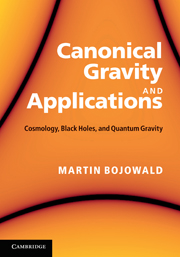5 - Global and asymptotic properties
Published online by Cambridge University Press: 05 August 2012
Summary
Hyperbolicity, as verified for general relativity in Chapter 3.4.2, guarantees the existence of local solutions in terms of initial data, but not the existence of global ones at all times. When evolving for long time intervals, singularities can develop in the solution and prevent it from being extendable further. We have already seen examples in homogeneous solutions of Bianchi models and the simpler isotropic solutions of FLRW models. In these cases, for matter satisfying the strong energy condition, there were always reasonable initial values which led to solutions with a diverging Hubble parameter and expansion rate at some time in the future or the past. The Hubble parameter corresponds to the expansion of the family of timelike geodesics followed by comoving Eulerian observers, a concept which presents a useful perspective in the context of singularities. When this expansion parameter diverges, the geodesic family no longer defines a smooth submanifold of space-time but develops a caustic or focal point where, in a homogeneous geometry, all geodesics intersect. For every spatial point on a non-singular slice, there is exactly one such geodesic intersecting it; when all these geodesics simultaneously intersect at the singular slice, it means that the whole space collapses into a single point after a finite amount of proper time. At this time, the initial value problem breaks down and space-time cannot be extended further.
- Type
- Chapter
- Information
- Canonical Gravity and ApplicationsCosmology, Black Holes, and Quantum Gravity, pp. 184 - 247Publisher: Cambridge University PressPrint publication year: 2010



